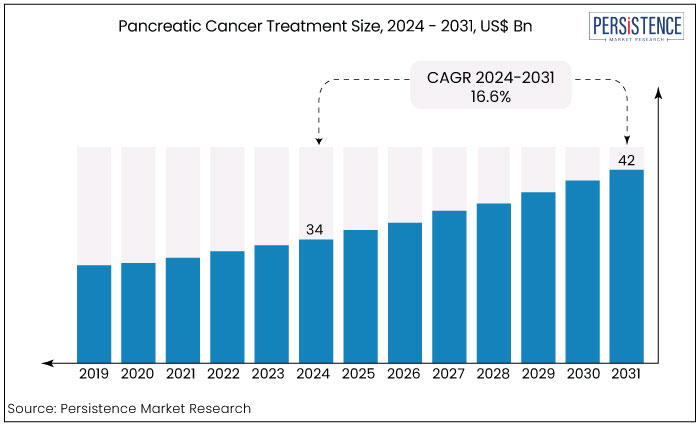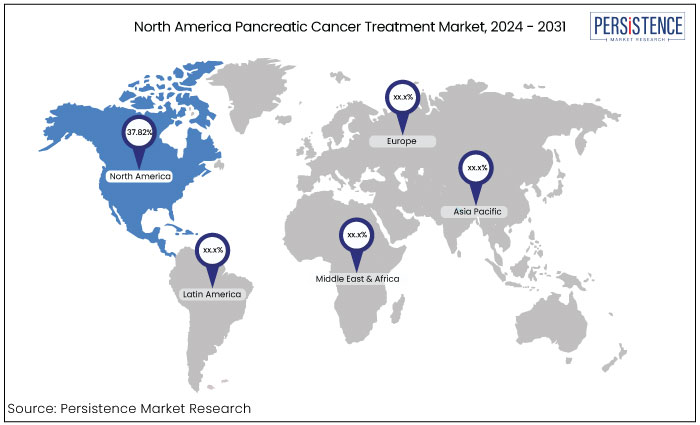Industry: Healthcare
Published Date: September-2024
Format: PPT*, PDF, EXCEL
Delivery Timelines: Contact Sales
Number of Pages: 174
Report ID: PMRREP34831
The pancreatic cancer treatment market is estimated to increase from US3.16 Bn in 2024 to US$9.28 Bn by 2031. The market is projected to record a healthy CAGR of 16.6% during the forecast period from 2024 to 2031. Pancreatic cancer cases are increasing due to unhealthy diets, heavy industrialization, and chemical exposure. The market is growing due to the collaborative research and development efforts are essential for new therapies.

Key Highlights of the Market
|
Market Attributes |
Key Insights |
|
Market Size (2024E) |
US$3.16 Bn |
|
Projected Market Value (2031F) |
US$9.28 Bn |
|
Global Market Growth Rate (CAGR 2024 to 2031) |
16.6% |
|
Historical Market Growth Rate (CAGR 2019 to 2023) |
13.2% |
|
Region |
Market Share in 2024 |
|
North America |
37.82% |
North America is projected to lead the market accounting for an impressive 37.82% of the market share in 2024. This dominance can be attributed to significant healthcare investments, supportive policies, and a marked increase in pancreatic cancer diagnoses alongside the presence of leading pharmaceutical companies.
Changing dietary habits have led to a surge in sugar, fat, and fast food consumption further contributing to the rise in cancer cases. As the population's pancreatic cancer treatment preferences shift toward unhealthy eating, the demand for advanced treatment options is expected to grow. This scenario underscores the urgent need for increased awareness and proactive healthcare measures to address the rising incidence of pancreatic cancer across the region.

Europe is expected to secure its position as the second most regional market in 2024. The surge in pancreatic cancer cases can be traced back to increased sugar intake, unhealthy diets, and lifestyle choices that have become prevalent in the region.
Heavy industrialization has raised concerns about chemical exposure, with pesticides and other harmful substances being detected in both raw and processed foods. These factors have contributed to a rising incidence of cancer throughout Europe.
The UK stands out as a critical area, housing a significant portion of the elderly population. The growing reliance on processed foods and alcohol, coupled with insufficient medical attention highlights an urgent need for enhanced clinical support to address these health challenges effectively.
|
Category |
Market Share in 2024 |
|
Type - Exocrine |
84.31% |
The pancreatic cancer treatment market is divided into exocrine and endocrine segments. Among these, the exocrine segment expected to command an impressive 84.31% market share in 2024.
Exocrine pancreatic cancer hinders the pancreas' ability to produce and deliver vital digestive enzymes to the small intestine, leading to severe indigestion. This condition can result from various factors, including diabetes, gastrointestinal surgeries, and cystic fibrosis.
The increasing incidence of chronic pancreatitis coupled with increased sugar and alcohol consumption has spurred demand for treatments within the exocrine segment. As awareness of these health issues grows, so too does the need for effective and targeted therapies to address the challenges faced by patients suffering from this debilitating disease.
|
Category |
Market Share in 2024 |
|
End Use - Hospital Pharmacies |
52.98% |
In 2024, hospital pharmacies are poised to emerge as the leading segment in the pancreatic cancer treatment market holding a substantial 52.98% share. Hospitals play a crucial role in providing care to pancreatic cancer patients due to their access to cutting-edge equipment, advanced medical devices, and highly trained professionals.
As a central hub for various cancer treatments, hospitals have become essential in managing both mild and moderate cases of the disease. The comprehensive services offered in these settings allow for a multidisciplinary approach to treatment, ensuring that patients receive the necessary attention and care. This trend highlights the importance of hospital pharmacies in the ongoing battle against pancreatic cancer and reinforces their critical role in enhancing patient outcomes.
The pancreatic cancer treatment market analysis shows steady growth, reaching a notable CAGR in the forecast period. The market encompasses a range of therapies and interventions aimed at managing and treating pancreatic cancer, a particularly aggressive and often fatal malignancy. This market includes surgical procedures, chemotherapy, targeted therapy, immunotherapy, and radiation therapy.
The sector is experiencing significant trends driven by advancements in research, technology, and a growing understanding of the disease's molecular biology. The increasing adoption of personalized medicine, which tailors the treatments to the genetic makeup of individual tumors to enhance efficacy and minimize adverse effects, is a prominent trend.
The rise of immunotherapy particularly checkpoint inhibitors and CAR T-cell therapies is transforming the treatment landscape offering new hope for patients who previously had limited options. Amidst pancreatic cancer treatment market trends, the integration of machine learning and artificial intelligence in diagnostic processes is on the rise.
There is a notable increase in collaboration among pharmaceutical companies, research institutions, and healthcare providers to accelerate the development of novel therapies.
The pancreatic cancer treatment market overview has presented notable growth over the past few years, with a CAGR of 13.2% from 2019 to 2023. This growth can be attributed to several factors, including increased awareness of pancreatic cancer, advancements in treatment options, and a greater emphasis on early diagnosis.
During this period, the market witnessed the introduction of novel therapies and improved surgical techniques significantly enhancing patient outcomes and survival rates. The rising prevalence of pancreatic cancer alongside an aging population has further fueled demand for effective treatment solutions.
The industry is anticipated to grow even faster, with a projected CAGR of 16.6% from 2024 to 2031. This optimistic forecast reflects ongoing innovations in the field including the development of targeted therapies and immunotherapies which are expected to revolutionize treatment protocols.
Collaborative efforts among pharmaceutical companies and research institutions to conduct clinical trials and research are expected to accelerate several market opportunities to develop new therapies. As healthcare systems increasingly prioritize personalized medicine, the market is poised for expansion.
Increasing Incidence and Awareness
The rising incidence of pancreatic cancer is a significant growth driver for the market. As awareness of the disease increases, more individuals are seeking medical attention leading to earlier diagnoses and treatment interventions.
Public health campaigns and educational initiatives have played a crucial role in informing the population about risk factors and symptoms associated with pancreatic cancer. As per the pancreatic cancer treatment market update, the heightened awareness encourages patients to pursue treatment options and stimulates research and development efforts to improve therapeutic outcomes.
Advancements in Treatment Modalities
Innovations in treatment modalities including targeted therapies and immunotherapies are propelling the pancreatic cancer treatment market growth. These advanced therapies are designed to specifically target cancer cells while minimizing damage to healthy tissues, resulting in improved efficacy and reduced side effects.
The development of personalized medicine approaches, which tailor treatments based on individual genetic profiles is also gaining traction. As these novel therapies continue to emerge, they are expected to enhance patient outcomes and drive market expansion significantly.
Collaborative Research and Development Efforts
Collaboration among pharmaceutical companies, research institutions, and healthcare providers is a key driver of growth in pancreatic cancer treatment market demand. These partnerships facilitate the sharing of knowledge, resources, and expertise accelerating the development of new therapies and clinical trials.
Increased funding for cancer research along with government and private sector initiatives is fostering innovation in treatment options. As a result, the market is witnessing a surge in the introduction of cutting-edge therapies, which are essential for improving survival rates and quality of life for patients.
High Treatment Costs
One of the significant factors impeding the market expansion is the high cost associated with advanced therapies and treatments.
Many innovative treatment options, such as targeted therapies and immunotherapies, come with higher price tags, making them inaccessible to a large population. This financial burden can deter patients from pursuing necessary treatments, leading to delayed diagnoses and poorer outcomes. Additionally, the lack of comprehensive insurance coverage for these therapies further exacerbates the issue limiting patient access and hindering overall market growth.
Limited Efficacy of Current Treatments
Another critical challenge impeding the pancreatic cancer treatment market is the limited efficacy of existing therapies. Pancreatic cancer is known for its aggressive nature and late-stage diagnosis, which often results in poor prognoses.
Current treatment options including chemotherapy and radiation may not significantly improve survival rates for many patients. The complexity of the disease coupled with its resistance to conventional therapies creates a significant barrier to effective treatment. This limitation not only affects patient outcomes but also discourages investment in research and development for new therapeutic options.
Development of Personalized Medicine
The future of the pancreatic cancer treatment market lies in the advancement of personalized medicine. As researchers gain a deeper understanding of pancreatic tumors' genetic and molecular characteristics, there is a growing opportunity to develop targeted therapies tailored to individual patients. This approach not only enhances treatment efficacy but also minimizes adverse side effects.
By leveraging biomarkers and genetic profiling, healthcare providers can optimize treatment plans, improving patient outcomes and potentially transforming the standard of care for pancreatic cancer.
Integration of Artificial Intelligence in Diagnostics
Another promising opportunity for the growth of pancreatic cancer treatment market is integrating artificial intelligence (AI) in diagnostic processes. AI technologies can analyze vast amounts of medical data aiding in the early detection of pancreatic cancer, which is crucial for improving survival rates.
By enhancing imaging techniques and facilitating the identification of subtle patterns in diagnostic tests, AI can help initiate timely diagnosis and treatment. This technological advancement can lead to more effective treatment strategies and a better understanding of disease progression ultimately benefiting patients and healthcare providers.
The pancreatic cancer treatment market is characterized by a dynamic competitive landscape, with key players consistently innovating to enhance their product portfolios. For instance, Amgen has made significant strides with the launch of AMG 510 (sotorasib) in 2022 targeting KRAS G12C mutations, which are prevalent in pancreatic cancer. These innovations reflect a broad trend toward targeted and personalized therapies, as companies aim to improve treatment efficacy and patient outcomes in a challenging therapeutic area.
Recent Developments in the Pancreatic Cancer Treatment Market
|
https://www.astrazeneca.com/Attributes |
Details |
|
Forecast Period |
2024 to 2031 |
|
Historical Data Available for |
2019 to 2023 |
|
Market Analysis |
US$ Billion for Value |
|
Key Regions Covered |
|
|
Key Market Segments Covered |
|
|
Key Companies Profiled |
|
|
Report Coverage |
|
|
Customization & Pricing |
Available upon request |
By Type
By End-use
By Region
To know more about delivery timeline for this report Contact Sales

The market is predicted to rise from US$3.16 Bn in 2024 to US$9.28 Bn by 2031.
AstraZeneca, Novartis AG, Pfizer Inc, and Genentech, Inc are some leading companies in the industry.
The exocrine segment is the leading and is expected to command an impressive 84.31% market share in 2024.
North America is the leading region and is expected to account for 37.82% of the market share.
The increased awareness of pancreatic cancer presents a key opportunity for the market players.